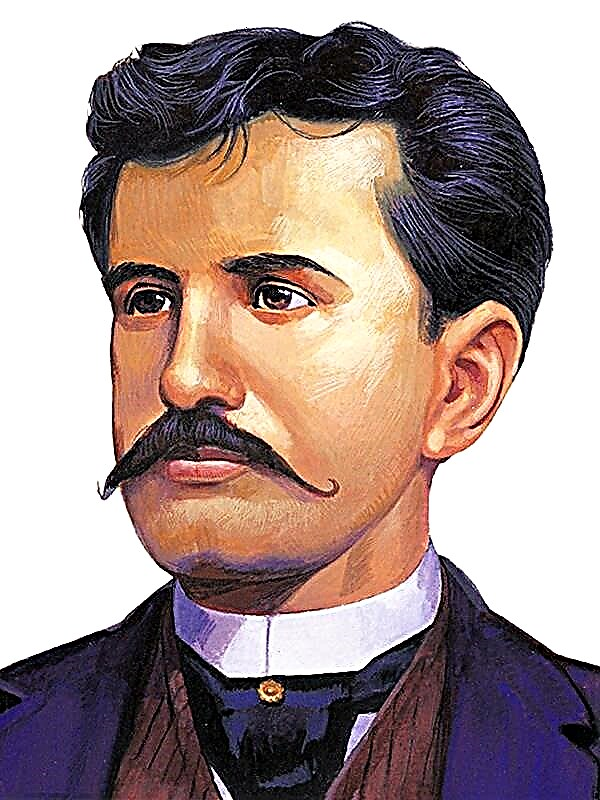To present the results of the future, you need to perceive the present differently.
Try to imagine the world in 2100. What do you see? For most people, the future looks pretty tempting. Speaking about the future, we mean not just the passage of time, but the progress achieved during this time, that is, differences from the present.
Progress is divided into horizontal and vertical.
- Horizontal progress is the development of existing ideas and innovations. Its main accelerator is globalization, which contributes to the spread of existing ideas among more people.
- Vertical progress is the creation of something that did not exist before: a new technology or production method.
That is, horizontal progress is “movement from 1 to n”, and vertical progress is “from 0 to 1”.
Example. Horizontal progress - mass production of phones and their distribution in developing countries. Vertical progress - the creation of a smartphone.
Vertical progress is difficult to predict, because you need to imagine something that does not yet exist in nature. Future progress can be predicted by looking at the present from a different perspective.
To see the future, you must be critical of the present. After all, only a person who is able to think outside the framework of established norms can see and change the future.
Example. The author considers this ability to be extremely important, therefore, at an interview, he asks candidates to quote a generally accepted belief with which they disagree.
Only you are responsible for your future
How to prepare for a meeting with such different and unknown circumstances that await you in the future?
Modern people are trying to prepare for any future, but it is useless, because it contains too many options and variables. It is better to make a focused effort and create your own future.
Example. Many students attend many extracurricular activities to get to a prestigious university. But is it not wiser to focus on one discipline in order to become the best in it?
It is a purposeful effort that leads to success, and not "higher powers". After all, if success was a simple consequence of good luck, we would not have seen the repeated achievements of people like Steve Jobs or the author of a book who opened several successful enterprises.
Each startup has one, the best future for it, requiring focused efforts. Why only one? Because it requires special conditions: one the best market for the company's products, one suitable time for release, etc. And in order not to miss the right moment, you must consciously choose your path.
The main difficulty is to determine the ideal conditions for a startup. Decide for yourself what future you are striving for. And remember that only a person who can think outside the framework of established norms can see the future.
Monopolies are good for business and society.
Hearing the word "monopoly", people think about large, criminal companies that are unjustly crowding out competitors. But they are wrong. It is believed that competition is an ideal economic incentive, as companies are trying to stand out from the rest. However, it is monopolies that foster innovation. How is this possible?
If you have a monopoly, this does not mean that competition is unfair. You just do something much better than others. If you create something new, and other companies cannot compare with you, this is not necessarily a bad thing.
Example. Google is a monopoly in the industry of search engines on the Internet, with almost no knowledge of competition.This may seem unfair to other companies, but it benefits everyone who enjoys using Google.
The monopoly is beneficial for society, as it contributes to progress - it inspires other enterprises to think up how to displace such a company from the market.
Example. To compete in the search engine market, a company must surpass Google. If she succeeds, it is consumers who will win.
Monopoly is a prerequisite for the existence of a highly profitable business. It allows you to set your own prices, providing high profits. If your product is not better than that of competitors, you will have to lower prices, which means reduce profits.
Example. In a highly competitive aviation industry, prices are incredibly low. In 2012, one passenger flight brought in only $ 0.37. At the same time, more than a quarter of Google’s revenue is profit.
Secrets of a successful company cannot be copied
In the modern world, it seems that the possibilities of vertical progress have been exhausted, and it is no longer possible to come up with something new. But this dangerous misconception can hinder your success. The world is full of secrets that most people do not know about. Therefore, they are so difficult (but not impossible) to reveal. Often these secrets are deeply rooted in society, and their discovery may take centuries.
Example. Slavery a few centuries ago was a common, socially acceptable phenomenon. At that time, the injustice of slavery was a secret.
The best secret for a technology company is advanced technology. They can make her leadership position invulnerable. You need to find and appropriate such secrets. Otherwise, you will become the next participant in horizontal progress, selling ordinary goods in a competitive market.
Example. In the 1990s, Hewlett-Packard developed the best technology and used it, releasing innovative products one after another (low-cost color printer and universal printer, copier and fax) - a crazy idea for that time. But in the 2000s, the company changed its strategy, as a result of which it lost half of its market value.
It takes years of work to create a successful, profitable company.
We represent monopolies as giants towering above our competitors. But they were not immediately like that: creating a successful monopoly takes a lot of time. This is especially true for profit: it may take decades for a startup to become a profitable business. But even if the company does not initially make a profit, it has value. Value is determined by the profit that it can receive throughout its activities.
Example. In 2001, PayPal made no profit at all. The author calculated the value of the company and found that most of it consists of income that PayPal should have earned only in ten years!
Do not expect to immediately become a leader - count on the long term.
How to make a startup a profitable monopoly? Start small and slowly develop. Become the best in your field. Start by looking for a market that is as narrow and specific as possible. So it’s easier to become a dominant player. And having won a monopoly in this niche, you can enter a wider market.
Example. Jeff Bezos (Amazon founder) has set himself the goal of becoming the world's largest online retailer. But at first he only sold books! Having conquered the book market, Amazon gradually began to offer other categories of goods. That is, Amazon came to success not overnight.
Startups need a solid foundation
The company must lay a solid foundation in order to survive in the long run. Therefore, the first days of creating a business are incredibly important. The main component of the foundation is good employees. Startups are usually small, and each team member plays an important role.
Example. Before investing in a company, the author analyzes not only people's skills, but also their personal connections.He knows what the disunity of the team means: before the founding of PayPal with Luke Nosek, the author invested in the Nosek company, which he opened up with a barely familiar person, and later their differences broke the enterprise.
The balance of interests of the owners of the company is also important. Founders and investors may have different interests, but the company should not suffer from this.
Example. Company founders can take the time to develop a product, and the board of directors is usually eager to make a profit sooner. These interests do not contradict each other, but can lead to conflict, so it is important to determine how to eliminate such situations at an early stage.
Build a solid culture in your startup team to increase your productivity. Corporate culture is not only pleasant bonuses for employees (a pool table and a vending machine with drinks), but also relations between people.
Example. Thanks to PayPal’s corporate culture, the team has become so close that many later opened their own companies together.
Your products will not sell themselves - employees do this
Hearing the word "sales manager", most imagine a man in a cheap suit, wandering door to door, offering to buy a vacuum cleaner. Not the most pleasant way.
But for a business, sales are vital. Technology enthusiasts prefer to focus on product development, but their efforts will be in vain if the product does not reach the consumer. No product will be bought unless sold.
Efficient sales require the right distribution. It includes not only sales channels, but also the labor of sellers. It is necessary to study the potential of each client before deciding how much effort to put into the sale.
Example. The author was one of the founders of the company Palantir, in which just one sale brought several million dollars. In such an enterprise, the general director must personally make the sale, since customers paying such amounts expect the personal participation of the head. If the deals bring in only a few hundred thousand dollars, it’s inefficient to spend time on highly paid CEOs. But the CEO will still need a strong sales team.
Another distribution method is to use sales strategies.
Many do not like sellers because sales are associated with manipulating people. Obvious attempts to influence the consumer do not bring success, but there are strategies that can convince anyone.
Example. Remember Tom Sawyer. He was such a skilled seller that he made money on painting the fence. But today there are no less creative sellers! The founders are great originals, but their vision is critical to the company.
What does the average startup founder look like? These are strange people, especially in the case of successful companies. Perhaps they are from birth or just imitate someone, but almost every founder of a successful company is a little ... extraordinary.
Example. Look at the PayPal founding team: almost every member is weird. As teenagers, four of them were even addicted to making bombs!
Originality is important because the founders do more than just open a company: they give it a vision. No matter how perfect management strategies are, a company must follow a specific mission.
Example. Remember Steve Jobs returning to Apple in 1997. He started with the release of the iPod in 2001, which analysts dismissed, considering the player only a fashionable gadget for Mac users. But all the genius of Jobs’s plan manifested itself when Apple introduced the iPhone and iPad, creating a series of Apple devices that have a sleek shape and exclusive features. Jobs actually made Apple the most expensive company in the world, following a plan based on his own vision.
Even great companies need the originality of their founders.
The most important thing
The success of a startup does not depend on luck. You yourself create your future if you are able to challenge generally accepted beliefs. Become the best in your business - and success will come to you!
- Take one niche first. If you find an unusual idea for a startup, do not try to conquer a large market right away. Identify a small niche where you can do something better than your competitors. By creating a monopoly on it, you can enter other markets.
- The world is still full of secrets - discover them! Remember that secrets are revealed only to those who can think outside the framework of established norms. You need to notice a winning idea that no one has yet developed, and master it in order to move from zero to one - only in this way you will succeed.












